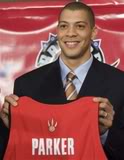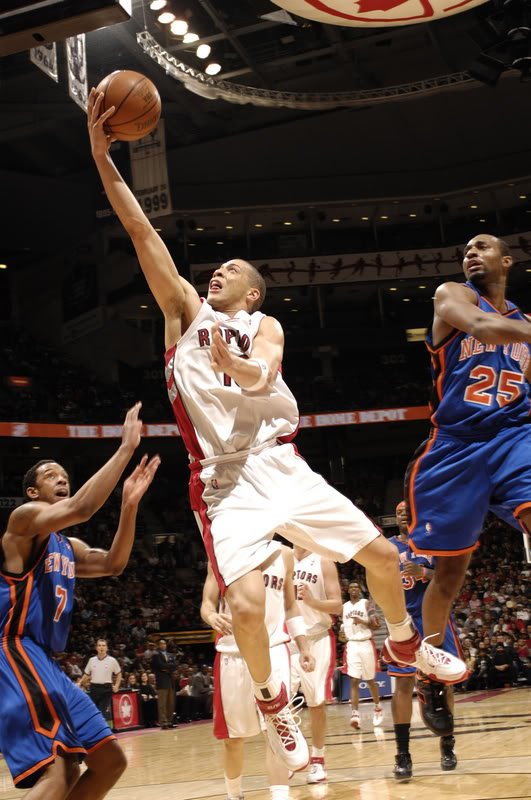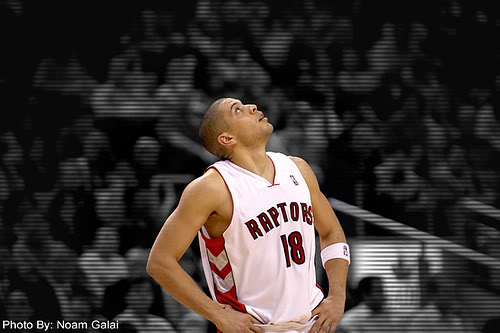The Parker Plan – A New Path for Those on the NBA Bubble
Posted by Blake Murphy on March 13, 2008
Man, Anthony Parker was good. Really good. Over four seasons at Bradley, Parker averaged 15 points, 5.7 rebounds, and 3.2 assists per night while kicking in close to a steal and a half and two thirds of a block per contest, too. He shot the ball in a fairly efficient manner, had 3-point range, and got to the line at a rate of over 5 times per game, a great number for the college basketball world. He also won the 1995 MVP award for the Missouri Valley Conference. The only real knock against Parker when he entered the NBA Draft in 1997 was that he might have been better served coming out the year before, when he put up college-career highs of 18.9-6.5-3.5 on 47.2% shooting and 42.2% from long range. His junior year was his best, but his staggering numbers and consistency across four seasons was what made him a reliable draft pick, either as a late lottery pick or a late-1st round steal.
Enter the New Jersey Nets, who selected Parker 21st overall. Many thought this was low for him, and looking back at that draft class, that seems correct (only three players from that class have ever been named to an All-Star team-Tim Duncan, Tracy McGrady, and Chauncey Billups). Parker was picked after such studs as Kelvin Cato, Maurice Taylor, Austin Croshere, Adonal Foyle, Scot Pollard, and an array of other faces you might not recognize sitting on NBA benches everywhere. When the Nets traded his rights to Philadelphia in a multi-player deal, the 76ers had scored a steal, so it seemed.
But things didn’t go quite right. Over his first two seasons, Parker managed just 39 games because of the team’s swingman depth and his own injury troubles. He scored just 74 points in his first two seasons, recording less than 200 minutes. In the summer of 1999, Parker was shipped to Orlando and despite the fresh start, he struggled again. Parker played just 16 games with sporadic minutes before being released in January of 2000.
It appeared that despite his strong college production and high expectations, Parker did not have NBA-calibre game. And then the best thing that could have happened to Parker happened.
Europe happened (insert requisite ‘NBA: where ____ happens’ joke here).
 Parker signed with Israeli powerhouse Maccabi Tel Aviv for the 2000-01 season and was reborn, handed a reason to recommit to the game of basketball and build his reputation and career over from scratch. It didn’t take long for Parker to do just that, and he was soon a key cog on a European goliath, a team that would win the Israeli Cup and the Suproleague Cup. Parker was instrumental the whole way and had grown popular for his hard defense, strong playmaking, thunderous dunks (don’t believe me? Check this out - http://www.youtube.com/watch?v=K1oYeigx784&feature=related), and his ability to score in a variety of ways.
Parker signed with Israeli powerhouse Maccabi Tel Aviv for the 2000-01 season and was reborn, handed a reason to recommit to the game of basketball and build his reputation and career over from scratch. It didn’t take long for Parker to do just that, and he was soon a key cog on a European goliath, a team that would win the Israeli Cup and the Suproleague Cup. Parker was instrumental the whole way and had grown popular for his hard defense, strong playmaking, thunderous dunks (don’t believe me? Check this out - http://www.youtube.com/watch?v=K1oYeigx784&feature=related), and his ability to score in a variety of ways.
The following season, Parker repeated his outstanding play, with Tel Aviv winning both of said championships again and even earning a berth in the Euroleague Final Four. His success in Israel had made him a hot commodity on the European market, and Parker decided to try his game in the elite Italian league, Serie A, signing with Virtus Roma. His numbers stayed as strong as ever, but the next year Parker returned to Maccabi to finish what he had started. He did just that, helping to win the Israeli domestic championship, the Israeli National Cup, and the Euroleage championship in both 2004 and 2005, a rare triple crown of European basketball. The next year they nearly completed the hat trick, losing in the finals to PBC CSKA Moscow.
Parker was a great college player, a bad NBA player, and then a European superstar. During his time playing in Europe, Parker won two Euroleague MVPs, a Euroleague Final Four MVP, an Israeli League MVP, several Israeli national titles, and two Euroleague Final Fours.

Having done just about everything one can accomplish in European basketball, the then-31 year old Parker sought to give an old challenge a new try. In July of 2006, basketball mastermind Bryan Colangelo brought A-P to the Toronto Raptors on a three year, $12M contract, a sizable sum both for a European import and a player who had struggled in the NBA previously.
The critics came out immediately, saying that European imports, despite the internationalization the game was undertaking, could not perform in the NBA. Parker was to be the cornerstone of the argument that European success does not translate to American success; that a player must develop in the U.S. to flourish in the U.S. Unfortunately for said pundits of international basketball, Parker has given the Raptors everything that was advertised.
Parker is a veteran leader on a young team, a co-captain, and the most consistent player on a team of wildly inconsistent players. He has developed his game such that his three point shooting is feared (45.5%), his multiple approaches to scoring are respected (12 PPG), and he is considered the best individual defender on a team devoid of such players. Five years ago, Parker would not have received run on a bad Raptors team. Now, he is a key cog in their success and development, their most reliable player on and off the floor, and one of the most popular players on the team.
When people speak about Bryan Colangelo’s international vision for the Raptors, Parker’s name is almost always mentioned alongside Bargnani, Calderon, Garbajosa, Nesterovic, Delfino, Brezec, and Gheardini. Parker is American. People seem to forget that. One could argue that Parker’s time in Europe has limited what he can be in the NBA – he is considered an international player, compared and discussed as such, and will never truly be an elite player, possibly because he spent his prime winning continental championships somewhere other than North America.
And players may look at that fact, the fact that Parker is unrecognized in NBA circles and underappreciated in any city that doesn’t have a CN Tower, and be weary of such a path to the NBA. They may also see the expanding D-League as their opportunity to mature and get noticed by an NBA team. To be fair, your chances of a call-up are better here, and being on an NBA team is almost always preferable to not being on one (Parker’s inability to find an NBA team drove him to Europe in the first place).
 But with all of these drawbacks in mind, I ask players on the fringe of NBA rosters, why not? At the very least, European teams pay American players a more-than-fair amount of money. They also offer playing time and, in most countries other than Spain, significant public respect and acclaim on par with or beyond that of local stars. But more importantly, Europe gives players a chance to reinvent themselves, to rediscover their love of the game and truly find themselves as ballers.
But with all of these drawbacks in mind, I ask players on the fringe of NBA rosters, why not? At the very least, European teams pay American players a more-than-fair amount of money. They also offer playing time and, in most countries other than Spain, significant public respect and acclaim on par with or beyond that of local stars. But more importantly, Europe gives players a chance to reinvent themselves, to rediscover their love of the game and truly find themselves as ballers.
Anthony Parker did this. If Parker had stayed in America, it’s likely he would have bounced around CBA teams and later, D-League teams, perhaps catching on with a team via a 10-day contract or training camp invite, but there really isn’t a precedent for a player like this to turn into an NBA contributor (yet, see: Moon, Azubuike). Parker afforded himself the chance to grow as a player, to learn how to deal with being in the spotlight, and to learn the parts of the game that are sometimes overlooked in American basketball (team play, smart defense, great cuts and picks, etc).
The trip to Europe and his time there made Anthony Parker a much better player than he was when he first stepped on a plane to Israel. It made him a more well-rounded baller and person, and eventually, gave him his second chance at life in the NBA.
Is that such a bad fate? Is there anything wrong with being Anthony Parker, being one of the best international players of all time and being a respected contributor to a winning NBA team? He may not have fame at its extremity or max-contract money, but he has the game of basketball, a guaranteed NBA roster spot, and a new home at 18 Parkerville Court in the hearts of Raptor fans.
I ask, then, why are other players so hesitant to try this? Is the competition in the D-League really that much better? With the number of international scouts growing exponentially, is there really that much better a chance of being noticed? And again, I point out, Americans balling in Europe make more money than D-Leaguers do, for sure.
I’m surprised that Anthony Parker’s success hasn’t bred more players heading overseas. Granted, there are a good number of Americans over there, but the middling prospects, the players who could really use it and would benefit from it, seem headstrong on battling for an end-of-the-bench job here at home.
It’s a decision I’m glad I don’t have to make, but for guys like Denham Brown, who left his D-League team mid-season last year, who have tried it, I have much respect. I have a great deal of respect for the players grinding their way to the NBA here, too, don’t get it twisted. My amazement is with the slim proportion that has the bravado to try their luck in Europe, is all.

March 13, 2008 at 12:17 pm
I wish I had a decision as tough as that to make, for it would mean that I had some basketball talent. lol. :P
Great article though bud! I’m totally surprised as well that more fringe prospects don’t go that route, but it is probably a very tough decision because of family.
March 13, 2008 at 4:18 pm
more players should attempt this path… players that come to my mind is Luke Jackson, (could do just what anthony parker did) as well as….. JJ Reddick.. yup i said it JJ.. great article blake, great idea , and the presentation is great. bring a tear to my eye .. Raptor fans love AP, and will always be love in Toronto. As Chuck says “Great on and off the court, one of the classiest guys in basketall”..
Look for a player like Carl English to take the same path as he is in Turkey i believe and was the MVP of the league last year.